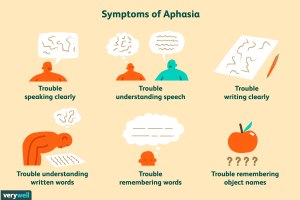INTRODUCTION:
Hello fellow team members of Team 7! The main purpose for this assignment is to define a single term in three different ways of understanding for those who are not familiar with it – all of three of which include a parenthetical, sentence, and expanded definitions of the term ‘Aphasia’ which is a term that I have used a lot in my research studies within the field of behavioural and cognitive neuroscience.
TERM: Aphasia
PARENTHETICAL DEFINITION: Aphasia is an inability to comprehend or formulate language from an individual
SENTENCE DEFINITION: Aphasia is a neurological disorder which causes an inability to comprehend or formulate language because of damage to specific regions of the brain
EXPANDED DEFINITION:
What is Aphasia?
- Aphasia is an impairment of language which affects the production or comprehension of speech and the ability to read or write. Aphasia occurs as a result of injury to the brain-most commonly from a stroke or a blow to the head from possible trauma.
What causes Aphasia?
- Aphasia is caused by damage to one or more of the language areas of the brain. Most often, the cause of the brain injury is a stroke. A stroke occurs when a blood clot or a leaking or burst vessel cuts off blood flow to part of the brain. Other causes of brain injury are severe blows to the head from trauma or possible infectious diseases.
What are the consequences of Aphasia?
- Aphasia can either be severe or mild; but both can make communication with the patient almost impossible due to lack of speech production. It can affect single aspect of language use, such as the ability to retrieve the names of objects, or the ability to put words together into sentences.

Figure 1. Common Symptoms of Aphasia that result in the innate inability to comprehend or form language.
Source: https://www.verywellhealth.com/aphasia-in-multiple-sclerosis-2440859
How is Aphasia treated?
- Research has shown that certain therapeutic methods that have been aimed towards improving diminished language impairment. Furthermore, a major component of effective language therapy may include patient awareness and education for immediate family to use of adaptive behaviors. This may elicit significant improvement of the disorder and reduce communication frustration. (Alexander and Hillis, 2008)
References:
Alexander P., Michael. Hillis, Argyle. Chapter 14 Aphasia. Handbook of Clinical Neurology, Vol. 88 (3rd series) Neuropsychology and behavioral neurology.
An Overview of Aphasia. Retrieved from: https://www.webmd.com/brain/aphasia-causes-symptoms-types-treatments#1
Aphasia Definitions. (n.d.). Retrieved from https://www.aphasia.org/aphasia-definitions/
Leave a Reply